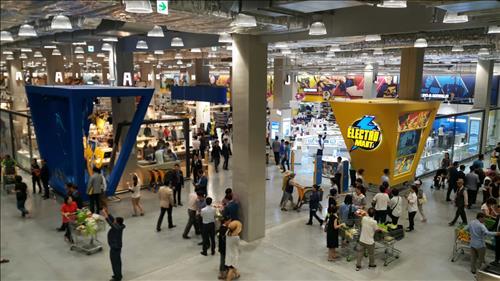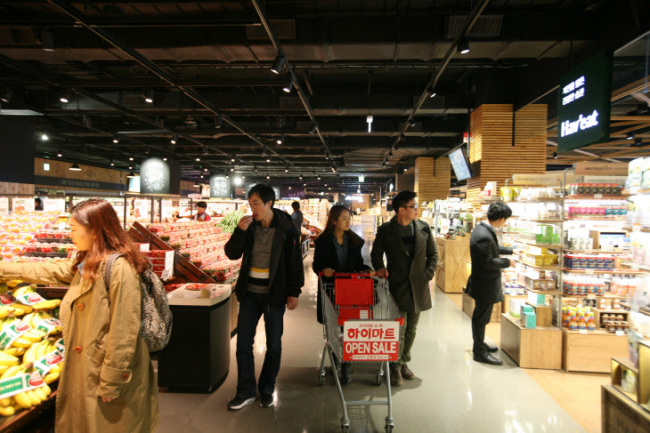Brick-and-mortar supermarkets strive to win back online customers
Traditional retailers bet on vivid shopping experience as a competitive edge against cheap and convenient online shopping malls
By Korea HeraldPublished : Feb. 18, 2016 - 20:28
Large supermarkets which are facing intense competition from e-commerce operators are striving to win back customers by providing what online stores cannot -- vivid on-field shopping experience at a brick-and-mortar outlet.
From selling insurance policies and rent-a-car to creating an “all-around shopping complex,” off-line vendors are keeping up with the trend, but spicing the atmosphere with the “one and only experience.”
From selling insurance policies and rent-a-car to creating an “all-around shopping complex,” off-line vendors are keeping up with the trend, but spicing the atmosphere with the “one and only experience.”

Lotte Mart, the large supermarket unit of Korea’s top retailer Lotte Group, in December opened its Yangdeok branch in Changwon, South Gyeongsang Province, and named it the third-generation shopping space.
Touting the themes of “organic,” “eco-friendly,” “health” and “relax,” the six-story 14,810 square-meter store is comprised of a range of shop-in-shops -- accessory outlet “It Street,” car furnishing shop “Motor Max,” gardening café “Page Green,” home furnishing store “Room by Home,” health supplement and organic food shop “habit” and more.
At each shop people are able to not only see but also touch, operate or use the products before purchase. The hallway has become wider while the shelves have been lowered to create a spacious and relaxed environment.
The store has generated 5.7 billion won ($4.5 million) in revenue within 10 days since the launch, 19 percent higher than the management’s initial target.
“In the first phase, discount stores used to provide cheap products with a wide range of choice. The second phase was to bring in private brands to create its own ecosystem. The third phase is about providing ‘Easy and Slow,’ a unique and vivid lifestyle experience,” a Lotte Mart spokesman said.

“The revitalization of discount stores relies heavily on providing a ‘new life’ instead of just products for customers. This is not something online shopping malls can do,” said Lotte Mart CEO Kim Jong-in.
Kim’s comment reflects the dire situation the traditional retail industry is facing.
Online beats off-line shopping
According to Statistics Korea’s report, the e-commerce industry -- including Gmarket, Auction and other open market as well as social commerce and other online malls -- reported 48.6 trillion won revenue between January and November 2015, up 19.5 percent from the previous year. It surpassed the growth of large supermarkets including E-mart, Lotte Mart, Home Plus and Hanaro Mart, which stood at 44.3 trillion won up 2.3 percent from 43.3 trillion won in 2014.
Experts attribute it to the growing number of people using mobile phones to shop and cheaper prices offered.
But perhaps the largest contributor is fewer barriers than traditional retailers.
According to Lotte, its online sales right after the traditional holiday seasons -- where many housewives are bound to binge in chores -- rose by more than 20 percent while footfalls to off-line stores dropped by 30 percent.
The Middle East respiratory syndrome outbreak from May to August last year also brought up the e-commerce operators’ revenue while dragging traditional retailer’s sales by double digits, as people refrained from visiting public or open spaces.
Many online stores are providing swift logistics service, enabling grocery deliveries -- which has long been regarded as the last resort for off-line marketers -- within a day of placing Internet orders, alarming the off-line store operators. More people rely on express delivery service for inexpensive items such as bottled water or detergents.
Countermeasures: Lock customers in
Homeplus, the country’s third-largest supermarket, started selling insurance policies, travel packages, used mobile phones and even arranges rent-a-car and hotel booking services.
“The essence of a retailer is to connect the manufacturer and the customers. And in that sense, service products are something that retailers can offer to the customers,” Kim Sung-eon, a Homeplus official, was quoted as saying.
E-mart, a flagship supermarket under Shinsegae, opened the E-mart Town in Goyang, Gyeonggi Province, where everything is on sale -- from drones to Star Wars goods, and to groceries, home furnishing goods, fashion items and more.
Its PEACOCK kitchen sells a variety of goods made with the company’s private home meal replacement brand, while smart gadgets, gaming and souvenir gears for grown-ups are on display at ELECTRO MART, alongside the E-mart and warehouse-style discount store E-mart Traders, Kids’ Sports Club, pet shop Molly’s, and home furnishing store The Life.
Shinsegae vice chairman Chung Yong-jin said that he wants people to come, feel and touch everything so that they “don’t want to get out of here.”
‘We have concluded that dominating our customers’ everyday life will be crucial in winning this game,” Chung was quoted as saying to a design magazine.
“Before, we studied about how to let people buy things swiftly and leave swiftly but now we want them to stay as long as possible so that they will shop more at E-mart than elsewhere. People spend an average of 3 hours in E-mart Town, three times more than at other E-mart outlets.
“We are focusing on creating our own platform and content, providing the customers a reason to visit and shop at our stores,” he said.
Seeking online territory
At the same time, traditional retailers are striving to tear down the barrier by actively joining the online world.
Lotte Mart, E-mart and Homeplus all operate their own online stores and pertinent warehouses. E-mart plans to run six warehouse for its online shopping mall, hoping Emart.ssg.com would generate 4.2 trillion won revenue by 2020, a fivefold increase.
Shinsegae developed SSG Pay, an online payment system that can be used at its affiliates including E-mart, online shopping malls, Shinsegae Department Store and even Starbucks.
“Supermarkets are seeing their market share eclipsed by e-commerce operators for now. But with the logistics infrastructure and strong funding capacity, traditional retailers are likely to catch up with the trend. And they are unlikely to lose the game,” Lee Ji-young, analyst at NH Investment & Securities, reported.
By Bae Ji-sook (baejisook@heraldcorp.com)
-
Articles by Korea Herald


![[Exclusive] Korean military set to ban iPhones over 'security' concerns](http://res.heraldm.com/phpwas/restmb_idxmake.php?idx=644&simg=/content/image/2024/04/23/20240423050599_0.jpg&u=20240423183955)




![[Herald Interview] 'Amid aging population, Korea to invite more young professionals from overseas'](http://res.heraldm.com/phpwas/restmb_idxmake.php?idx=644&simg=/content/image/2024/04/24/20240424050844_0.jpg&u=20240424200058)

![[Pressure points] Leggings in public: Fashion statement or social faux pas?](http://res.heraldm.com/phpwas/restmb_idxmake.php?idx=644&simg=/content/image/2024/04/23/20240423050669_0.jpg&u=)









